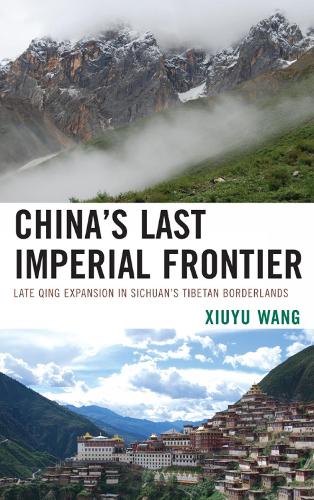
China's Last Imperial Frontier: Late Qing Expansion in Sichuan's Tibetan Borderlands
(Paperback)
Available Formats
Publishing Details
China's Last Imperial Frontier: Late Qing Expansion in Sichuan's Tibetan Borderlands
By (Author) Xiuyu Wang
Bloomsbury Publishing PLC
Lexington Books
3rd May 2013
United States
Classifications
Professional and Scholarly
Non Fiction
International relations
951.035
Physical Properties
Paperback
308
Width 153mm, Height 226mm, Spine 23mm
440g
Description
China's Last Imperial Frontier explores imperial China's frontier expansion in the Tibetan borderlands during the last decades of the Qing. The empire mounted a series of military attacks against indigenous chieftaincies and Buddhist monasteries in the east Tibetan region seeking to replace native authorities with state bureaucrats by redrawing the politically diverse frontier into a system of Chinese-style counties. Historically, at all the strategic frontier locations, the state had been for the most part outstripped by local institutions in political, military, and ideological strengths. With perceived threats from the Anglo-Russian Great Game accentuating Qing vulnerability in Tibet, the Sichuan government took advantage of the frontier crisis by encroaching upon local and Lhasa domains in Kham. Even though the Kham campaign was portrayed in Qing official discourse as a part of the nationwide reforms of New Policies (xinzheng) and administrative regularization (gaitu guiliu), its progress on the ground was influenced by the dynamics of interregional relations, including Sichuans competition with central Tibet, power struggles among Qing frontier officials, and varied Khampa responses to the new regime. The growing regionalism intensified the resistance of local forces to imperial authority. Despite the uneven results of the late Qing campaign, it had come to serve as an important source of sovereignty claims and policy inspirations for the subsequent governments.
Reviews
Xiuyu Wang's book is an excellent narrative and analysis of the last frontier expansion project of the Qing, in the Tibetan region of western Sichuan. China's troubled relationship with its Tibetan population is one of the legacies of this early twentieth century effort. Wang combines geographical, ethnographic, and historical approaches very well, and connects his study to comparative literature on imperial expansion. This is a fascinating and impressive contribution to the study of modern China's frontier and ethnic history. -- Peter Perdue, Yale University
This is a finely wrought study of the expansion of the late Qing state on the southwestern frontier. It not only illuminates the political debates over how best to tame the 'wild west' of Kham, but gives a penetrating analysis of the connections between those policies, efforts at military modernization, and the rising tide of revolution in Sichuan. Carefully researched using original Chinese sources, Wangs account is a valuable addition to the growing literature on the place of the frontier in the making of modern China. -- Mark Elliott
One of the main strengths of the book is Wangs use of Chinese-language sources, including some Grand Council archival documents and hitherto unexplored Qing officials accounts of Tibet. Wang provides a good analysis of the Qing motives and global issues that propelled aggressive frontier policies.... [T]he book is strong in its use of Chinese sources and does provide a good assessment of late Qing polices toward Tibet and Sino-Tibetan border regions. Xiuyu Wangs Chinas Last Imperial Frontier: Late Qing Expansion in Sichuans Tibetan Borderlands is a welcome addition to the growing body of scholarly works on Kham, the Sino-Tibetan frontier. * Journal of Asian Studies *
Author Bio
Xiuyu Wang is professor of history at Washington State University Vancouver.
